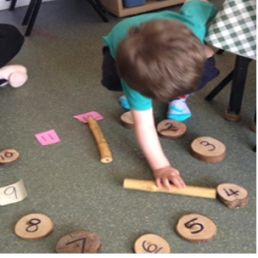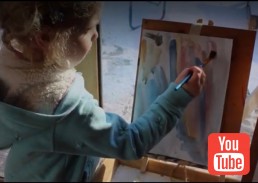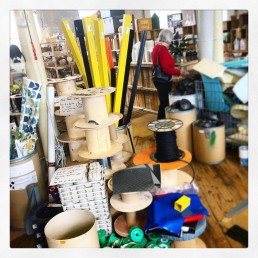Pre-school Maths
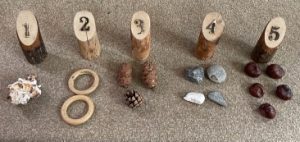
Mathematical development is complex. Developing a secure grasp of early mathematical ideas takes time. Even if a child appears to be engaging successfully in mathematical activities, such as reciting the count sequence, they may not understand the meaning of the numbers they are saying. It is important that practitioners are aware of typical development of mathematical skills and concepts and have the knowledge to support children’s understanding.
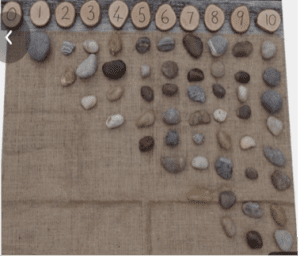 We at Inspirations have observed how beneficial the use of loose parts is for maths development. When children transform objects in their creative play, they are unknowingly problem-solving and building their imaginations. For example, when sticks and stones become food, mathematical concepts are natural encouraged as they assess the shapes, sizes and amounts they need. Often children will simply use loose parts to line up, order in size, number and make patterns.
We at Inspirations have observed how beneficial the use of loose parts is for maths development. When children transform objects in their creative play, they are unknowingly problem-solving and building their imaginations. For example, when sticks and stones become food, mathematical concepts are natural encouraged as they assess the shapes, sizes and amounts they need. Often children will simply use loose parts to line up, order in size, number and make patterns.
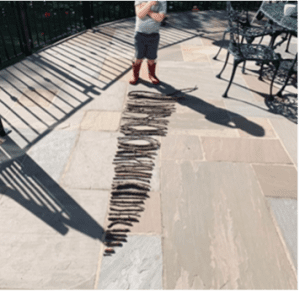 Pattern is extremely important for maths development. Recognising number through pattern and subitising (instantly recognising without counting) are skills we can help to develop by using a wide range of ideas and resources. Children will quickly recognise what the patterns on dice represent as numbers and progress to adding two sets of number patterns through board games and play.
Pattern is extremely important for maths development. Recognising number through pattern and subitising (instantly recognising without counting) are skills we can help to develop by using a wide range of ideas and resources. Children will quickly recognise what the patterns on dice represent as numbers and progress to adding two sets of number patterns through board games and play.
Dots seen in a regular pattern representing numbers has been used to support addition and subtraction in schools for many years.
. . .
. . = 7 . . = 3
. .
.
Eventually children become familiar with each number representation as they see these same patterns while recognising the shapes they make.
Numicon uses familiar shapes to represent numbers. Exploration of these resources at a young age will familiarise a child with their shapes and colours and eventually numbers will be assigned to each shape. As the shapes are 1-10 they can be used for ‘number bonds to ten’ by fitting the shapes together to form the 10th shape. They can also be used to support ‘adding beyond 10’ or ordering them as numbers and matching the numerals.
![]()
Conceptualising number through pattern can be supported in many other ways such as playing dominoes, using dice in a board game, playing cards or using tens frames.
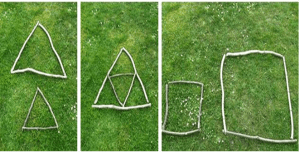 Challenges and activities to support maths progression can be planned regularly with adult support. Practitioners can work with children, sensitively intervening with questioning and prompts. Metacognition is the ability to reflect on your own thinking processes. Practitioners should encourage children to explain their thinking and strategies when solving mathematical problems. This enables children to gain an insight into their own thinking, learn from their mistakes, and develop problem-solving skills. Questions such as, ‘How did you…?’, ‘Why does this…?’, encourages children to reflect more deeply and to put their thought processes into words. Our practitioners seize chances to reinforce mathematical vocabulary in everyday situations. For example, by commenting on which child is standing ‘first’, ‘second’, or ‘last’ in line, which child has ‘more than’ or ‘fewer’ objects than another child and how many steps it takes to climb the stairs. The introduction of more refined mathematical vocabulary is then slowly increased through focused activities.
Challenges and activities to support maths progression can be planned regularly with adult support. Practitioners can work with children, sensitively intervening with questioning and prompts. Metacognition is the ability to reflect on your own thinking processes. Practitioners should encourage children to explain their thinking and strategies when solving mathematical problems. This enables children to gain an insight into their own thinking, learn from their mistakes, and develop problem-solving skills. Questions such as, ‘How did you…?’, ‘Why does this…?’, encourages children to reflect more deeply and to put their thought processes into words. Our practitioners seize chances to reinforce mathematical vocabulary in everyday situations. For example, by commenting on which child is standing ‘first’, ‘second’, or ‘last’ in line, which child has ‘more than’ or ‘fewer’ objects than another child and how many steps it takes to climb the stairs. The introduction of more refined mathematical vocabulary is then slowly increased through focused activities.
 Physical whole-body movement and gestures support the learning of mathematics, for example, moving along a physical number line or jumping and clapping while counting. Practitioners should also encourage children’s use of fingers which are important manipulatives, initially useful for supporting counting and later for counting in groups.
Physical whole-body movement and gestures support the learning of mathematics, for example, moving along a physical number line or jumping and clapping while counting. Practitioners should also encourage children’s use of fingers which are important manipulatives, initially useful for supporting counting and later for counting in groups.
It is important to realise that not all maths activities need specific or specialised resources, anything can be counted and numbers can be formed with most materials. During Covid lockdown, Inspirations provided a virtual nursery and the first activity we suggested was to go for a walk and collect natural resources. These were then used in our future activities to ensure that all children could take part without having to purchase anything.
Maths opportunities are all around us. We should encourage learning in this area through numerical songs, games, activities and play, to help children develop a keen attitude for maths, so they can follow this interest when it becomes a lot trickier in formal school!
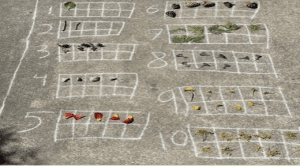
Deborah Keane
Seekers of Meaning
New Video
Over the last few weeks I have been filming the children as they explore the Art Studio. To read more about our Art studio you can go back to last weeks blog.
The children's current shared interest is construction and building houses from clay, bricks, sticks and blocks. Some of that is captured in our brand new video that you can watch here-
https://www.yout ube.com/watch?v=4-59qb9GgdQ
ube.com/watch?v=4-59qb9GgdQ
Something Out of Nothing
‘In any environment, both the degree of inventiveness and creativity, and the possibility of discovery, are directly proportional to the number and kind of variables in it.” - Simon Nicholson
 As the changing seasons are constantly providing us with natural loose parts, at Inspirations we are constantly adding to our materials and resources, reinventing the classroom and replenishing our supplies. We are always on the look out for cable reels, pallets and tyres locally to ensure our environment is a constant source of stimulation. SCRAP (Scrap Creative Reuse Arts Project Ltd) is one place in particular that provides us with many open ended resources, and this week was time for another haul.
As the changing seasons are constantly providing us with natural loose parts, at Inspirations we are constantly adding to our materials and resources, reinventing the classroom and replenishing our supplies. We are always on the look out for cable reels, pallets and tyres locally to ensure our environment is a constant source of stimulation. SCRAP (Scrap Creative Reuse Arts Project Ltd) is one place in particular that provides us with many open ended resources, and this week was time for another haul.
Since 2004 SCRAP has been a social enterprise based in a creative space at Sunnybank Mills, Farsley, Leeds, and if you haven't been we thoroughly recommend it.
Want to know more about our nursery? Call 0113 2585800
Viewing Objects in a New Light
There's something about walking into SCRAP that ignites our imaginations regardless of age. Being surrounded by so many types of materials sparks joy and opens up a feeling of endless possibilities, it invites you to see the magic in objects that would otherwise be discarded. Scrap is a place that encourages us to view old objects in a new light, and it is exactly what we aim to do at Inspirations Nurseries.
It was Simon Nicholson who developed the theory of loose parts in 1971, he proposed that open ended materials could empower young children creatively, and that the presence of such materials and objects inspire children to construct, manipulate and transform through self directed play. The idea of loose parts goes far deeper when we consider it being combined with additional sources such as gravity, music, light and shadow which we will look into further as we move our focus to include the Reggio Emilia approach as a whole.

 Here are some of the items we got from SCRAP this week, which have been implemented into each room. This week we will be recording ways in which our children use some of these items in play and how they adapt them for construction, art projects and role play. We will share this footage on our Youtube and social media accounts so stay tuned.
Here are some of the items we got from SCRAP this week, which have been implemented into each room. This week we will be recording ways in which our children use some of these items in play and how they adapt them for construction, art projects and role play. We will share this footage on our Youtube and social media accounts so stay tuned.
There's something very inspiring seeing how children can make something out of 'nothing', and this is a reminder that people of all ages need to allow time and space to make connections between all the little things that our larger ideas are built from.
- Nathalie
 Scrap is open to the public Weds - Sat, and includes a reSTORE eco friendly refill store. Please ensure you are wearing a face mask due to the current restrictions or you can buy one there from a selection of handmade reusable materials.
Scrap is open to the public Weds - Sat, and includes a reSTORE eco friendly refill store. Please ensure you are wearing a face mask due to the current restrictions or you can buy one there from a selection of handmade reusable materials.
For more information about our nurseries call us on:
Adel: 0113 2612262
Horsforth: 0113 258 5800
